DON'T MOVE HERE... Unless you're Okkervil River
Austin's most poetic band came down from boarding school New England
Taking its difficult name from a short story by Russian writer Tatyana Tolstaya, Okkervil River's original lineup consisted of three former New Hampshire high school mates who, after college, moved to Austin in 1998 to start a band. "We had a really hard time getting shows in Austin," said chief songwriter Will Sheff. So the singer/guitarist, bassist Zach Thomas, and drummer Seth Warren, along with new keyboardist Jonathan Meiburg, recorded a couple EPs at home that were good enough to get them into SXSW 2000. There, at Opal Divine’s, they were seen by producer Brian Beattie (Glass Eye) and a rep from Jagjaguwar, who asked for a demo. The Indiana label put out debut LP Don't Fall In Love With Everyone You See, whose standout track “Westfall,” inspired by the manhunt of evil following the 1991 yogurt shop murders, announced the arrival of a stunning young poet/songwriter. But Sheff’s erudite lyrics also led to the “lit rock” tag, which sounds more like homework than a good time.
Down the River of Golden Dreams, also produced by Beattie, showed musical growth in 2003, but it was 2005's Black Sheep Boy that established Okkervil as a national act. Lou Reed heard "For Real," a song seemingly about kids cutting themselves just to feel something real, on Sirius satellite radio, and became a fan, tapping Okkervil to open for him at the debut of the Highline Ballroom in New York City. Bruce Springsteen was also a fan, through his son, and intently watched the band’s set at Bonnaroo from the side of the stage.
Okkervil finally started selling records in 2007 with The Stage Names, which debuted at No. 62 on the Billboard LP chart and landed an appearance on Late Night With Conan O'Brien. The band performed "Our Life Is Not a Movie or Maybe" like the rock stars of their teenaged fantasies. The LP’s opening 1-2-3 punch of “Movie,” the glammy “Unless It’s Kicks,” and “A Hand to Take Hold of the Scene” sounded designed to throttle “lit rock.”
"I sometimes read (in reviews) this image of myself as humorless and melodramatic, but I think they're not picking up on the playfulness and the joy in our records," Sheff told me in 2007. The theme for the sessions that produced The Stage Names was "be generous." Producer Beattie explained: "I was thinking about when Magical Mystery Tour came out - what a gift it was to anyone who listened to it. The Beatles knew how much they owed their fans and so in a totally uncompromising way they just gave them more."
"Be generous" meant more musical ideas, more curious instrumentation, and definitely more drums. Hard-hitting Travis Nelson, added on Black Sheep, made them a rock band.
The album’s most stunning moment was the juxtaposition of "John Allyn Smith Sails," a song written from the point of view of poet John Berryman on the verge of his 1972 suicide, with a cover of "Sloop John B," a 1930s Caribbean folk song popularized by the Beach Boys. The line "this is the worst trip I've ever been on" is the hinge between the quite different tunes.
The Stage Names is one of the greatest LPs to ever come out of Austin, and there was so much left over from the sessions that it became a delayed double album with The Stand Ins. Meiburg, now firmly rooted in former Okkervil side project Shearwater, makes a strong appearance, duetting with Sheff on “Lost Coastlines.”
Next up for Sheff and his charges would be 2010’s collaborative True Love Cast Out All Evil (Anti) credited to “Roky Erickson with Okkervil River.” Roky’s first album in over a decade, it seemed an odd musical coupling at first- Austin's mystical madman and its articulate Pitchfork band. Erickson’s spectacular return to performing after years of mental distress was based on his ability to rock hard on such setlist exclamations as "Don’t Slander Me," "Two-Headed Dog" and "You’re Gonna Miss Me," so it was assumed his comeback album would be one of screeching vocals and big sonic strokes.
But producer Sheff had a different idea. True Love is a record of tattered little songs that had practically been abandoned, brought back in a spiritual whirl of dust and hope.
"I obsessively listened to about 60 songs that Roky had written, that were either never recorded or minimally released," Sheff said. Although he's a fan of Erickson's "horror rock" material, Sheff found himself drawn more to the songs of simple grace. "Roky was in a prison for two years and he had to come to terms with the thought that his musical career could be over," said Sheff. Such freshly recorded songs as the title track, the delicately moving "Forever" and the haunting "Goodbye Sweet Dreams" were the soundtrack to the years when he went from Austin's golden child to its most notorious recluse. “These songs were written to serve the immediate purpose of keeping him sane,” said Sheff, whose liner notes for True Love Cast… received a Grammy nomination. “They're so powerful."
What Sheff did with Roky’s songs he would do with his own, producing the next Okkervil River album I Am Very Far as a deeply introspective departure in 2011. “It represents me trying to break everything I was trying to do on The Stage Names. When I was done with I Am Very Far, it felt like this big castle with a moat around it and spikes, trying to keep people out. When that was all done, I was ready to get out of the castle and get some fresh air."
He found it in his hometown of Meriden, NH, which he had called "the invisible town that doesn't exist," with its two TV channels (PBS and CBS) and no record stores. The Silver Gymnasium (2013) became a project when, while staying with his grandfather an hour away, Sheff decided one day to drive to the town where he had felt both alienated and nourished. "A big explosion happened in my brain," he said. Unchanged from when he left for college almost 20 years earlier, Meriden made the musician feel as though he'd never left. "When I was writing I Am Very Far, I was thinking a lot about the endings of things. I was thinking about death and loss and when things are broken in a way that can't be fixed. And somewhere along that process, I came to realize that I was thinking just as much about the beginnings of things."
Sheff climbed French's Ledges, the small mountain that overlooks the town, and felt a strange spiritual tug. "I was walking through those woods that I remember so well, but the overwhelming feeling I got was that the woods remembered me. That's when I started thinking that maybe I should've made a childhood autobiography record instead of I Am Very Far."
He was sitting that afternoon of September 2013 at the downstairs bar in Stubb's, where Okkervil River would later shake the rust off a two-year hiatus with a hastily announced tour send-off. Because Sheff relocated to Brooklyn in 2008 and the rest of the group resides in Austin, they’d been furiously cramming and jamming all week.
“I always felt like I was the most uptight person in Austin,” Sheff told Spin in 2011. “Now I feel like I’m the most laid-back person in New York.”
When the band and producer John Agnello, chosen for recent work with Kurt Vile and engineering on Eighties albums by Cyndi Lauper and others, settled into David Boyle's Church House Studios in East Austin to record The Silver Gymnasium, Sheff put his 1982 Conan the Barbarian action figure, still in the box, in the vocal room. The placement wasn't to get him in the mood to sing about childhood memories. Rather, Conan had accompanied Sheff on every Okkervil River recording since 1998's debut Bedroom EP. This favorite childhood toy had become Sheff's studio guardian, the singer as superstitious about it as a major league baseball player is about his lucky socks. One morning he arrived to find Boyle holding it and asking if it was his.
"Yeah, that's mine," said Sheff. "But it had been unopened."
Boyle was mortified. The evening before, his five-year-old son had found the box and asked an intern to open it for him.
"I am so, so sorry," Boyle gushed, but Sheff just shrugged.
"Well, I guess it was just time for someone to open that box." Sheff would certainly do that on the album, the band’s first on major indie ATO (My Morning Jacket, Patty Griffin).
"You're spit into the center of your hometown," Sheff sings at the start of "Down Down the Deep River," which pairs with "Pink-Slips" to form Gymnasium's spiritual core. "Deep River" swells like radio-friendly Springsteen, but there's something ominous going on. Are the kids in the tent telling ghost stories or are they describing real events?
"And as the rescue party, the volunteer team – they're just kids of 18 and it's the worst thing they've seen," he sings over a hypnotic groove. "We can never go back; we can only remember."
Sheff said he was high on life for a week when he wrote that song. "It summed up something I wanted to say about my whole life, about my childhood and my adulthood and my friends and my town. That song is supposed to feel happy and sad, like my childhood.
"Nostalgia is a cleaned-up, airbrushed version of memory. I wanted to cop to that on some level, because I find myself getting nostalgic for things I know I was unhappy doing."
"Pink-Slips," with accents from an old AM radio melody and synth frills, breaks from New Hampshire lyrically. "Nine years down in Texas/With sluts of both sexes/Liars, lumps, and drug addicts, and drunks/I love my friends," he sings.
"I wanted to write about places in your childhood that you could relate to no matter where you grew up," explained Sheff. "I think the way to do that is to be more specific. The more I write about New Hampshire, the more it reminds you of Texas."
Born on the Seventh of July
Sheff's a Bicentennial Baby, born July 7, 1976, to a pair of school teachers.
"I was a moody kid. I'd been very, very sick and grew up in the atmosphere of being aware of a high level of anxiety," he said. When he was 18 months old, he was diagnosed with life-threatening epiglottitis, which was treated with a tracheal tube.
"My parents had to clean out the trach tube every day and I had to sleep a certain way or I would suffocate," he states. "I was just a physically fragile child after that. I had severe asthma. Often I would turn blue and have to be rushed to the hospital."
Sheff's mother had suffered two miscarriages before Will, so, he said, "I was a golden boy. They really roll out the red carpet when you're the oldest." His first time onstage was as Baby Jesus in a Christmas pageant.
"When I went off to school, I realized the brutal truth, which is that I was a spazzy, weird kid with terrible social skills. Not good at sports, not good at relating with other kids."
He became a target of the rough farm kids he went to elementary and middle school with. "My life was made very miserable by them, but at the same time, I was in a very beautiful place," recalled Sheff. "I loved where I lived. I had a rich imagination. My parents were wonderful."
The idea for a major work about Meriden, New Hampshire, circa 1986, goes back to Sheff's high school days, when he was inspired by Dylan Thomas’s Under Milk Wood, about ordinary people in a fictional town. “It really rung true with me about what my town was like. And Twin Peaks was a big show for me, really all of David Lynch's stuff. I started to recognize that my town is a neat, small place where all these stories and interesting characters could come from." As a sophomore, he started writing stories based on the people and places all around him.
He attended the exclusive Kimball Union Academy boarding school (founded in 1813), whose nearly $50,000 a year tuition has led some writers to characterize Sheff as being a child of privilege.
"That really makes me angry when I read it," he said. "I went to Kimball for free because my parents taught there."
Sheff credits KUA teacher Simon Harrold with encouraging his literary ambitions. Harrold had a giant bookshelf in his study and when Sheff visited, he'd be prescribed literature.
"He'd go, 'Oh you like Dylan Thomas, well then you should read Ulysses.' I had a hard time with James Joyce as a 16-year-old, but I would read everything he suggested because it was important to me to be a writer. It's like if I wanted to be a gymnast, I would have to do a lot of exercise in my spare time."
The titular gymnasium, built in 1914 and named after Charles Silver, could refer to the place where one puts in work as a young person to develop into the kind of artist/athlete they wish to become.
Okkervil followed Gymnasium with 2016’s Away, which opens with “Okkervil River R.I.P.”, a death notice for the man Will used to be, as identified as the band he used to lead. Written and recorded in New York, with Sheff producing, Away felt more like a Sheff solo LP than Okkervil, whose drummer Cully Symington, plus Meiburg, were the only carryovers from Texas.
"2013-2015 had been a strange time for me,” Sheff wrote of Away’s set-up. “I spent a good deal of time sitting in hospice with my grandfather, who was my idol, while he died. New songs were coming fast up there, so I set myself the challenge of trying to write as many as possible as quickly as possible. The idea was just to write through what I was feeling, quickly and directly. Eventually, I realized I was writing a death story for a part of my life that had, buried inside of it, a path I could follow that might let me go somewhere new."
That route takes us to Nothing Special, a Will Sheff solo album like all the others, only this time it’s finally billed as such. Released Oct. 7 on ATO, the LP follows the “be generous” theme of The Stage Names, while nailing the velvet coffin of ye olde Austin music scene.
Wrote Pitchfork: “That this solo album is so good, so immersive, and so thoughtful only makes Okkervil River seem even deader.”
The gorgeous title track of Nothing Special is an ode to joyful anonymity, and how things sometimes fall apart when dreams are starting to be reached. Specifically, it’s about Sheff’s falling out with drummer Travis Nelson after the Stage Names/Stand-ins project and tours.
“When I was just a kid, I got caught up in the dream of being a rock and roll star,” Sheff wrote to introduce Nothing Special. “Like so many other young people, I fell in love with the idea of being called to this glorious path outside of ordinary life. And I ended up in a band with people who felt this same call - especially our brilliant drummer Travis Nelsen, who was like a brother to me. We would trade tales of hilarious antics and outrageous excess and tragic death like they were almost scripture. Travis and I fell out painfully, and he died in the early weeks of lockdown. I think a big part of Nothing Special centers around grieving for him, grieving for everything my friends have lost, grieving for the rock and rock and roll myth, and trying to open my eyes to a more transcendent reality.”
I'm stranded on the shore/ And you're gone forevermore/And embraced at the baseline, so deep/ You were lost, or I was cowed/ But it doesn't matter now/
We'll discuss it some time I'm asleep
- Will Sheff, “Nothing Special.”
Don’t count out Okkervil River, Austin’s Band of the Year for 2007. Sheff’s web site is still okkervilriver.com, and the new album comes up on Spotify with a search of “Okkervil.” They’ll be some distance, however, on this project. The closest Sheff and his New York band come to Austin on the international tour is Denver. The itinerary is here, along with four videos from the new album.
READ MORE Don’t Move Here…
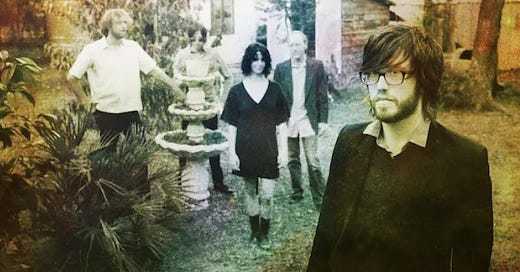


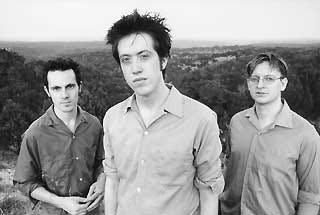

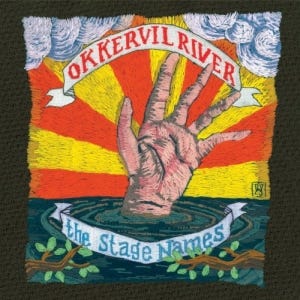
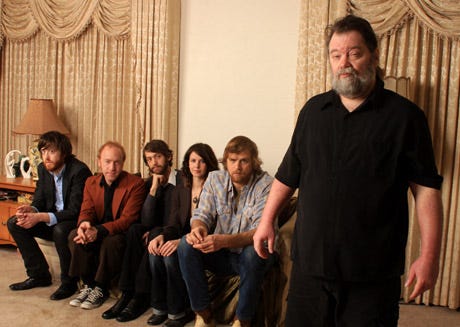

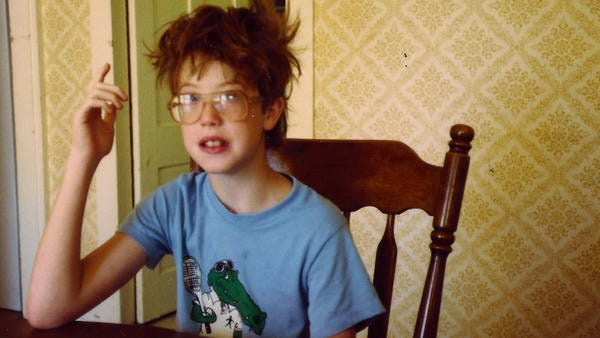
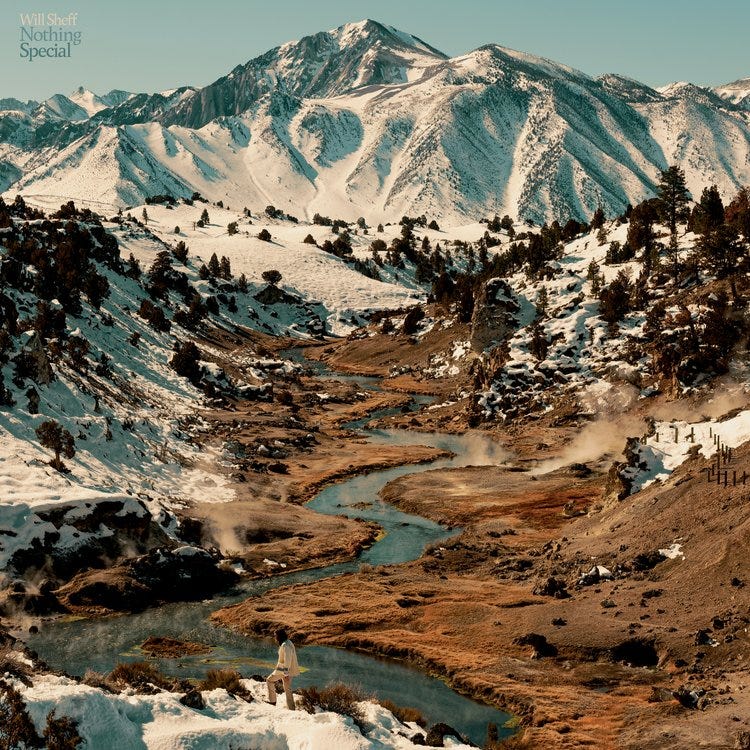
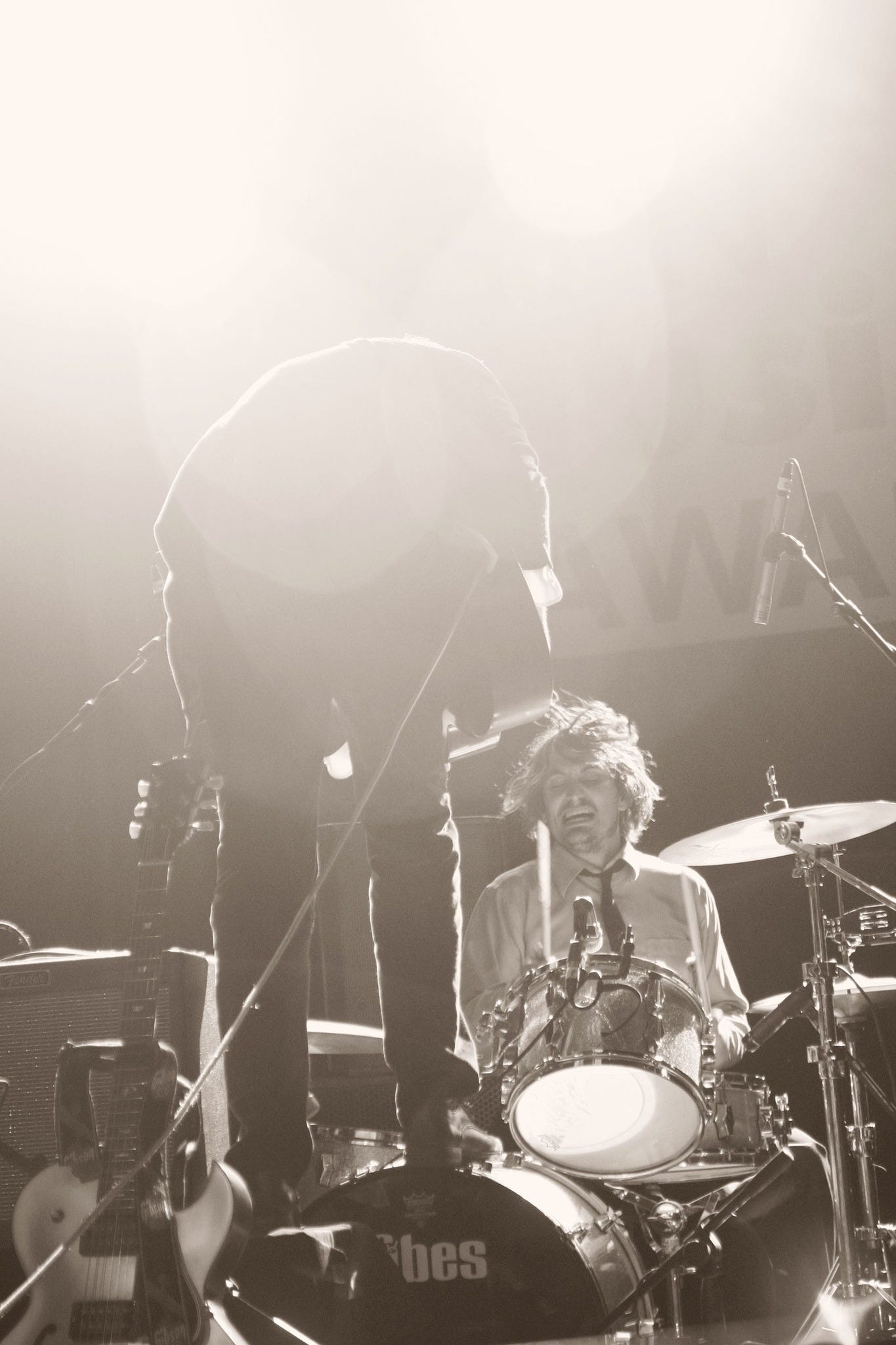
I remember these guys from way back then! They graced our stage at Opal Divine’s when we were 5 days old. Their first SXSW gig Saturday, March 18th, 2000!
Another band I never heard of, but somehow your post makes them intriguing. Good show.